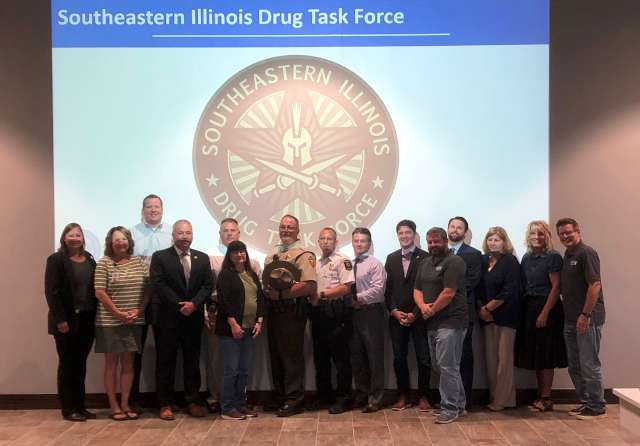
Legislators, Law Enforcement Meet to Discuss Drug Task Force Funding

Published on July 20 2022 3:08 pm
Last Updated on July 20 2022 4:52 pm
Written by Greg Sapp
A gathering of law enforcement and legislators took place Wednesday morning in Effingham to discuss dangerous drugs and how to make sure there are resources available to combat them.
The meeting was organized on behalf of the Southeastern Illinois Drug Task Force, a group of law enforcement agencies battling drug activity in the region. The Task Force is currently made up of representatives from the Illinois State Police, Effingham County Sheriff's Department, and the Salem and Robinson police departments.
Illinois State Senators Jason Plummer and Steve McClure were in attendance along with representatives of Congresswoman Mary Miller, State Senator Darren Bailey and State Representatives Blaine Wilhour and Adam Niemerg. Clay County State's Attorney Phillip Givens was also present.
State Police Master Sergeant Brian Gray, who is a Task Force participant, served as the program presenter. He was joined by ISP Captain Ryan Shoemaker and ISP Lieutenant Holly Finney.
The chief points raised were that there is a lot of drug activity in the region, and fewer resources available, both monetarily and personnel. Without tipping the Task Force's hand as far as knowledge of criminal activity, Gray shared that Evansville and St. Louis are sources of drugs, particularly methamphetamine. It was also shared that whereas 20 years ago meth was produced by "good ole boys" in pretty unsophisticated operations, today's meth production involves a "professional organization of drug dealers".
The Task Force is hampered by a lack of funds that would allow law enforcement agencies to pay for the personnel that would replace Task Force participants. Instead, local agencies are having to pay for the Task Force member and that officer's replacement.
Another factor is the dwindling supply of officer candidates, leaving local agencies deciding whether to dedicate an officer to the Task Force or keep their own force properly staffed.
The Task Force receives grant funding from the US Department of Justice to help fund officers assigned from local agencies. The amount received, though, isn't enough to cover the costs, leaving it to local agencies to cover the balance.
Plummer and McClure said after the briefing that they are faced with seeking additional resources in a General Assembly that has been about changing sentencing and time spent in prison rather than toughening penalties.













